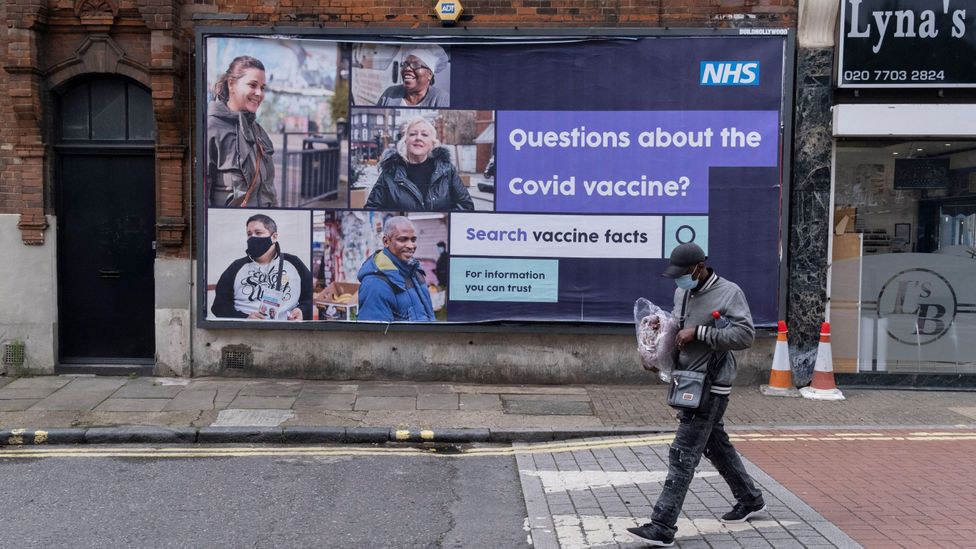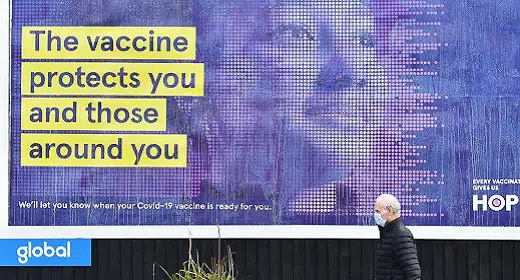By David Robson: Researchers have uncovered the best way to discuss the benefits of vaccination with someone who’s unsure.
Here are the dos and don’ts of these tough conversations. Nearly one year after the US Food and Drug Administration approved the first Covid-19 vaccines, you probably don’t need me to persuade you of their efficacy. At the time of writing, more than 4.28 billion people have been given at least one dose, which is around 55.8% of the global population.
Despite this enormous uptake, it’s also likely that you will know at least one person in your family or friendship group who has not yet received the vaccine through personal choice rather than a lack of availability. These people are often characterised as fervent anti-vaxxers who willingly reject science – and we are sometimes told that any attempt to engage in a discussion is simply a waste of breath.
The truth, of course, is more complicated. It’s certainly true that some committed conspiracy theorists are intent on spreading misinformation, but these small-but-highly-vocal groups do not represent the majority of people who have yet to take the vaccine.
Even before the Covid-19 pandemic, low confidence in vaccines in some parts of the world was described as a “global crisis” by global health experts and there are now very real concerns that it could affect efforts to end the pandemic. Researchers have been looking for ways to help governments persuade vaccine-hesitant people for some time. Unsurprisingly there is no single solution, but a major part of their strategy is talking and engaging with people who are hesitating.
In reality, many of the vaccine-hesitant are simply undecided – and scientists say talking to them can help them to appraise the evidence. And it isn’t just governments and health officials who can do that. “Social cues are crucially important,” says John Cook, a cognitive scientist at Monash University, Australia. “So letting our social networks know about our views can be influential.”
Whether or not your acquaintances listen to your opinions will depend on your conversational style, however – there’s simply no point in labouring the facts if you present them in the wrong way.
Drawing on multiple studies of effective communication, I’ve compiled a list of evidence-based advice on the best ways to discuss the science behind vaccines – and the behaviours you should avoid.
1) Pick your battles
The first rule of effective communication – in any domain – is to target the right audience. And recent research suggests that many of us may be overlooking the very people who would respond well to our message.

People are more likely to be vaccine-hesitant if it’s difficult to access the vaccine (Credit: Getty Images)
Take a recent paper by Christopher Bechler, an assistant professor of marketing at the University of Notre Dame in Indiana, which looked at people’s attitudes to behaviours such as mask-wearing. In one experiment, proponents were offered the chance to pass on some potentially useful information on the topic to people with a range of views.
The participants were much more likely to target those on the negative end of the spectrum. Yet Bechler found that the information had very little impact on these people’s opinions. Instead, the message was more effective at strengthening the views of the people who were already weakly in favour of the safety measure. “They were much more receptive to the message,” he says.
The implications for vaccination messaging is clear. “We’d prefer to flip someone else’s viewpoint from anti-vax to pro-vax,” says Vanessa Bohns, a social psychologist at Cornell University and author of You Have More Influence Than You Think. “But we can have a bigger impact by talking to someone who’s already leaning in that direction.”
2) Be humble
The second rule of effective communication concerns our humility, as we try to understand the other person’s point of view.
“It’s important to have a two-way dialogue, where we listen with empathy and genuinely seek to understand what their objections are,” says Cook, who recently co-authored a free Covid-19 Vaccine Communication Handbook. “Trying to change a person’s mind by making them feel stupid is not a path to success.”
Bohns agrees. She points out that many of us may have also had doubts ourselves – yet we tend to forget that fact once we’ve made the decision. “And by the time we’re trying to convince someone else, we’re expressing this certainty that makes it makes it really hard for us to meet them where they are.”
She says that it would be far more effective to acknowledge our initial concerns and to explain how we came to the decision that we made. “People baulk at feeling like someone’s judging them – and I think that can come across when you express too much certainty,” she says. “It’s the difference between telling people what they should do, instead of telling them what we did, and why.”
In her book on persuasion, You Have More Influence Than You Think, Bohns points to a study of health messaging led by Ann Kronrod at the University of Massachusetts Lowell. The team found that, when giving advice, most people tend to prefer very assertive messages, delivered as a command. When taking advice from others, however, many people respond much better to gentle suggestions.

One way to tackle misinformation is to simply present some useful facts, such as how the Covid-19 vaccine trials were carried out (Credit: Alamy)
In one experiment, half the participants were told: “Doing abdominal exercises for five minutes a day can strengthen your core. You can do it!” The others were given more forceful advice: “Do abdominal exercises for five minutes a day. Strengthen your core. Just do it!” One week later, Kronrod’s team questioned the participants about their physical activity.
People who were already open to the idea of exercise tended to react well to both messages. Those who were already resistant, however, responded much better to the gentle suggestion, while the forceful command was a distinct turnoff.
3) Make it personal
As we engage in these conversations, and actively listen to what the other person has to say, you may find that the concerns are mostly practical. Recent studies suggest that the convenience of accessing the vaccine is one of the best predictors of hesitancy. If that’s the case, you might be able to offer help with potential barriers, such as making the appointment or organising transport to the health centre. In other cases, you might find that there are specific misunderstandings about safety or efficacy that you can discuss (see below).
If you find yourself in conversation with someone who is strongly opposed to the vaccine, you may find it most effective to emphasise the individual benefits of immunisation, according to a study by Sinéad Lambe, a research clinical psychologist at the University of Oxford.
Early this year, Lambe’s team recruited more than 15,000 online participants and measured their initial attitudes to vaccination. Each participant was then randomly assigned a piece of information about the vaccine, addressing either safety concerns, the collective benefits (such as the reduced risk of transmission to other people), or the personal benefits.
These included statements such as: “Catching coronavirus can seriously disrupt your life… And you can’t be sure, even if you’re relatively young and fit, that you won’t be seriously ill or struggle with long-term Covid-related problems: as many as one in five people are still unwell five weeks after contracting Covid-19; one in 10 are still experiencing symptoms three months later. Vaccination minimises the chances of you falling ill with Covid-19, so you won’t need to worry about what the virus might have in store for you…”
The participants were then measured again for their level of vaccine hesitancy.

Research suggests that it’s better to focus on the individual benefits of vaccination, rather than the collective good (Credit: Getty Images)
Overall, the information about the personal benefits proved to be the most persuasive to the people who had initially expressed the greatest hesitancy. It even trumped a combined message that had attempted to explain how the vaccines could help both the individual and other people.
Lambe says that she was initially surprised by the result, but it fits with previous studies, which had suggested that vaccine hesitant people tend to have less trust in society. “So they might feel slightly excluded, and they may be less likely to be motivated by the collective benefits,” she says.
4) Describe the methods beneath misinformation
Occasionally, you may find that a vaccine-hesitant person has been misled by misinformation. It is common to hear that the clinical trials were “rushed”, for example. In this kind of situation, it’s worth acknowledging that it is useful to question the quality of any scientific study, before describing the long-term development of the underlying vaccine technology, which had been tested for years before the emergence of Covid-19. You could also explore the size of the Covid-19 vaccine trials – with tens of thousands of participants – and the continued monitoring of side effects. You could also look for online graphics that demonstrate the relative risks of catching Covid-19, compared to the vaccine.
In other cases, it can be useful to explain the underlying tactics that help propagandists to spread misinformation. It is common, for instance, for people to claim false credentials that would appear to make their claims more believable – even if they have no real expertise in a relevant area. Sometimes, pressure groups will even create surveys signed by many of these alleged false experts to question the prevailing scientific opinion and to create the illusion of debate.
Both tactics were employed by the tobacco industry to erode trust in the mounting scientific evidence against cigarettes; more recently, they have been used to erode public understanding of climate change.
When it comes to Covid-19 and the vaccines, some charlatans claim to have a superior understanding of virology and immunology than the true experts – despite having no qualifications or credible scientific publications to support their fringe views. (If you want to find out more, the psychologist and communication scientist John Cook has created a video on the phenomenon here.)

It’s easier to nudge people towards vaccination if they’re already on the fence (Credit: Getty Images)
Some of the people you know may have also been exposed to dubious reports that deliberately mistake correlation with causation. When more than half the world’s population has been vaccinated, some of the recipients will inevitably get sick from another, totally unrelated illness. People with a fiercely anti-vaccination agenda will point to these coincidences and claim some causal link between the vaccine and the illness. This tactic is used to suggest that there are hidden dangers to the vaccine – whereas the medical data suggests that serious side effects are incredibly rare.
It is very easy to be duped by messages that are crafted in this way. Cook’s research, however, suggests that explaining these kinds of deceptive techniques can help to reduce a person’s belief in misinformation, particularly if they are yet to form a strong opinion on a subject. The method is sometimes termed “inoculation” or “pre-bunking”, since the knowledge helps protect people from falling for similar kinds of fake news in the future too.
There is no sure-fire way to change minds. By following these four suggestions, however, you may find yourself having far more constructive conversations with the people you encounter. If you’re successful correcting their misunderstandings, they may then go on to persuade other people. “They could become advocates,” says Bechler. In this way, the truth itself becomes contagious.


















































